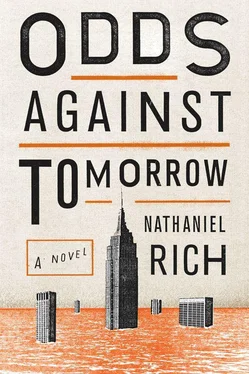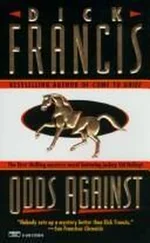“Hey guys,” said Hank. He sounded sleepy. “Glad you came.”
“Where is everybody?” said Jane.
“Guess they’re scared.” Hank looked at his watch. “I think it’s just us three.”
They stood in silence for several moments. Jane hiccuped.
“Yeah,” said Hank. “Let’s probably go.” He started walking in the direction of the bridge.
Jane took Mitchell’s hand, and squeezed it.
“I’m putting all my trust in you,” she said.
“And I’m putting all my trust in Hank Cho.”
Jane stopped in her tracks. “You’ve completely lost it.”
Laughing, they followed the giant into the darkness.
* * *
Queens was invisible. From the span of the Hell Gate they could see, ahead and to the left, the white glare of the klieg lights over LaGuardia Airport. The Mosquitoes were doing their work, sucking the polluted water from the runways and spraying the slurry into the bay in geysers that sparkled like formations of dark quartz. The rest of the borough was dark. It was a cloudy night, the moon as invisible as the Rockaways, so it was impossible to assess the damage in the neighborhoods beneath the train tracks. Still, Mitchell thought he could glimpse forms moving in the blackness — anxious, darting movements, like scurrying rats. Only much larger. He told himself it was a figment of his imagination.
“Just follow the light,” said Hank, like a deathbed priest. Once they’d crossed the bridge, he aimed a yellow industrial flashlight in front of him. A second, dimmer model was tucked into his belt, mostly illuminating his buttocks but also spilling down to trace the narrow gravel strip between the northbound and southbound tracks. The gravel bounced and flickered as he walked, the light wobbling with each of his lumbering steps — for such a strong man he was rather clumsy of gait. They walked single file, Jane in the middle. And they didn’t talk. What was there to say? Any efforts at trivialities sounded absurd, even blasphemous against the night’s silence. There were no birdcalls, no crepitation of insects, not even frogs — only the crunch of the gravel and the light phthapping of the flashlight against Hank Cho’s bottom. After about half an hour, or an hour, or two — it was impossible to tell anymore — Hank halted their procession. He passed out cans of water and they drank greedily. When they were finished they tossed the empty cans over the railing and listened closely, as if the clink of the cans might describe the terrain of the streets below. But all they heard were three large plops. They kept walking, more quickly now.
What were they doing? What were they thinking? Mitchell tried not to think at all by concentrating on the path. He had to be careful to walk in a straight line so as not to veer off the tracks.
But of course he had already veered off the tracks. That’s exactly what he had done! He had run himself off the rails: the rails of his career and perhaps of his sanity. He had never adhered to them well — they’d always been slick, his sanity rails. And now the train was careening into the darkness, the engineer slumped unconscious over the wheel, his shoulder pressing on the accelerator. But this newest excursion was not entirely inconsistent with his past behavior. He had been running away from things for as long as he could remember: from Overland Park, the Zukorminiums, Fitzsimmons Sherman, FutureWorld, New York, Ticonderoga, Randall’s Island. The more he ran from things, the less he knew where he was. Where would it end?
“Are you still there?” Jane asked without turning.
“Yeah,” he said. But he wasn’t so sure.
“I’m still here,” said another voice in the darkness. It was a female voice, but it wasn’t Jane. And it spoke without sound.
“I don’t think you are,” said Mitchell, soundlessly. “I don’t think you’re anywhere.”
“Then why can you hear me?” said Elsa.
Mitchell didn’t have an answer to that one.
“It’s like this for me,” she continued. “Walking down a long track through darkness, unable to see or hear anything.”
“Are you in pain?”
“I am not going to answer that.”
“We’re more similar than we’re different, aren’t we?”
“We do have something in common,” said Elsa.
“Obsession.”
“There aren’t so many like us, you know. We are crippled by extreme beliefs.”
“ Extreme seems a bit extreme. I would say strongly held.”
“We don’t listen when others try to tell us something.”
“We don’t listen unless it suits us,” said Mitchell. “You didn’t listen to me.”
“You still aren’t listening to me.”
“I’m trying. I am.”
“Obsession gives us purpose. I don’t think your friend understands that.”
Mitchell looked at Jane ahead of him, walking lazily over the gravel.
“Without obsession,” said Mitchell, “I have nothing. All I have is wandering through a shapeless black void.”
“What are you going to do when you get to the Flatlands?”
“I don’t know. I’m afraid. What am I going to eat? Drink? Will there be anything resembling a bathroom? Will there be more violence? And say I do make it a few days, what happens next? Can you tell me?”
“I cannot.”
“But do you know? Do you know what’s waiting for me in the Flatlands?”
“Oh yes,” said Elsa, and there was something dark and tinkling in her voice. “I know what is waiting for you.”
Elsa was laughing and the track curved slightly to the right and the dancing light from Hank Cho’s flashlight bounced over the tracks, disrupting the darkness. And Elsa was gone.
How good his fears had been to him! While they lingered, he had that thing so exalted by schoolteachers and guidance counselors: an All-Consuming Passion. He had a profession too. He missed them, his fears, just as he missed his skycity and even, in a perverse way, the cockroaches. Now there was only the void. With every step he took on the elevated tracks, the barrier weakened — the barrier that separated what was inside him and what was outside of him. The broken world beyond the tracks was seeping inside him. Or was it the other way around?
He reached for Jane’s hand. She squeezed it. But since he was walking behind her this soon became awkward and she pulled her hand away.
* * *
“How long do you think it’s been?” said Jane. She was on the edge of tears.
“Two and a half hours?”
“I’d say six.” She sighed. “Please, God, let this end soon.”
They were taking a bathroom break. During the last stretch the track had run for several minutes through an underground tunnel — a short but horrifying tunnel, which was like walking through an ink blot — and when they emerged they were at ground level, the tracks hemmed between two lines of trees. It looked like they had entered a forest. Had they left the city? Were they in Long Island? Were they back in Central Park? Jane had squatted ten yards behind him, several paces from the tracks. Mitchell was pissing on the southbound track. He wasn’t going to piss in the woods. He didn’t want to know what was in the woods.
“Six hours, the sun would be out.”
“Who knows. The same rules don’t seem to apply.”
“It’s been four hours and twenty-five minutes,” said Hank. It was the first thing he’d said other than announcing the bathroom breaks. “And that over there? Way up ahead? That’s Flatlands Avenue.”
“Where?” said Mitchell.
“There,” said the giant, pointing at a vague, slightly paler patch of darkness in the distance, past where the trees ended.
“So this is the Flatlands,” said Jane.
“It’s Canarsie,” said Hank. “But close enough.”
Читать дальше












